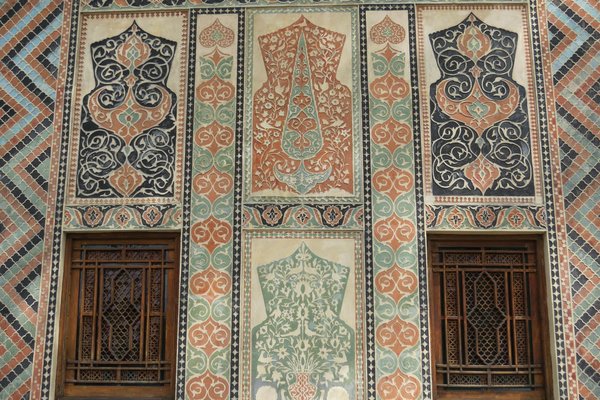Azerbaijan
Sheki
The Historic Centre of Sheki with the Khan’s Palace is an 18th-century trade town known for its silk farming.
Sheki was the capital of the short-lived Shaki Khanate, with the Khan’s palace as one of its most notable remaining landmarks. The urban plan was geared towards sericulture, with a hydraulic system distributing the water to the cultivated gardens with mulberry trees and residential houses with spacious attics to accommodate silkworm breeding.
Community Perspective: traditional architecture and small-town feeling in a beautiful setting in the foothills of the Caucasus Mountains, with the Sheki Palace as the most memorable monument with abundant and detailed decoration both in- and outside.
Site Info
Official Information
- Full Name
- Historic Centre of Sheki with the Khan’s Palace (ID: 1549)
- Country
- Azerbaijan
- Status
-
Inscribed 2019
Site history
History of Sheki
- 2019: Advisory Body overruled
- ICOMOS had recommended Not to Inscribe, overturned by amendment lead by Kuwait
- 2019: Inscribed
- Inscribed
- 2017: Referred
- 2017: Advisory Body overruled
- ICOMOS recommended Not to inscribe
- Type
- Cultural
- Criteria
- ii
- iv
Links
- UNESCO
- whc.unesco.org
- Official
-
- azerbaijan.travel — Azerbaijan tourism on Sheki
All Links
UNESCO.org
- whc.unesco.org — whc.unesco.org/
Official Website
- azerbaijan.travel — Azerbaijan tourism on Sheki
News Article
- July 14, 2019 660citynews.com — 19 hurt by falling tree branch at Sheki Palace
Community Information
- Community Category
- Urban landscape: Post-medieval European
Travel Information
Recent Connections
-
Creative Cities
Crafts and Folk ArtSee www.unesco.org
-
Notable Hotels
Karvansaray / Yukari Karavansarai Hotel… -
Caravanserai
"The "Caravanserai" historical complex …
Connections of Sheki
- Geography
- History
-
-
Feudalism
"Sheki is also an exceptional testimony to the feudal system of the Caucasian khanates, which developed from 1743 to 1819, as expressed in the architecture of the Khan's palaces, the interiors of wealthy merchant houses, and the fortifications." - UNESCO Description -
Located in a Former Capital
Of the Shaki Khanate (between 1743 and 1819)
-
- Architecture
-
-
Urban fabric
"Besides the manor houses, Sheki's public buildings encompass religious structures, identified in the urban fabric by the vertical lines of the mosque minarets, public baths and caravanserais." - AB Evaluation
-
- World Heritage Process
-
-
WHC locations
Baku (2019) -
Controversial at inscription
the AB was overruled from Not to inscribe (No OUV or other reasons) to Inscribe by the WHC - where in an earlier stage a Not to Inscribe was already rolled back to Referral
-
Reconstruction regarded as unsatisfactory
"In some repairs, inappropriate materials including concrete and cement mixtures had been used, while new architectural developments, predominantly for hotel functions, had not respected the volumes and proportions of the historic architectural fabric. All of this led to the conclusion that integrity and authenticity had been affected by past and recent developments and restorations to such a degree that they could not meet the necessary levels." - AB Evaluation
-
- Human Activity
-
-
Silk Manufacture
Silkworm breeding was a major industry
-
- Constructions
-
-
Caravanserai
"The "Caravanserai" historical complex in Sheki consists of two magnificent caravanserais, traditionally named "Yukhary" and "Ashaghy" caravanserais, which in Azerbaijani signify the "Upper" and "Lower" Caravanserai, respectively. Construction of these caravanserais is dated to the 18th–19th centuries AD. (wiki)See en.wikipedia.org
-
Notable Hotels
Karvansaray / Yukari Karavansarai Hotel located in the historic Upper Caravanserai.See ulduztourism.az
-
- WHS on Other Lists
-
-
Creative Cities
Crafts and Folk ArtSee www.unesco.org
-
- Timeline
-
-
Built in the 18th century
the current historic town of Sheki’s oldest structures date to the year 1772 (AB ev)
-
- Visiting conditions
-
-
Strict no-photography policy inside
Not allowed in the Khan's Palace and Shakikhanov's house
-
News
- 660citynews.com 07/14/2019
- 19 hurt by falling tree branch at …
Recent Visitors
Visitors of Sheki
- AC
- Afshin Iranpour
- Alexander Barabanov
- Alexander Lehmann
- Ammon Watkins
- Ana Lozano
- Aspasia
- Bin
- Boj
- Bram de Bruin
- Cheryl
- Cirene Moraes
- Clyde
- CugelVance
- Els Slots
- Emili Xaus
- Erfe91
- Erik Jelinek
- Eva Kisgyorgy
- Fan Yibo
- George Gdanski
- Hammeel
- Harald T.
- Harry Mitsidis
- henryjiao18
- hotpickle
- Iain Jackson
- Jesse S 2010
- JobStopar
- Jonas Kremer
- JoshHad
- Juha Sjoeblom
- jxrocky
- KarenBMoore
- Ken DJ
- KentishTownRocks
- Knut
- Krijn
- Kurt Lauer
- Liamps91
- Loic Pedras
- Ludvan
- Luis Filipe Gaspar
- marcel staron
- MatusBeber
- MH
- Michael Turtle
- Pchxiao
- Philipp Leu
- Reza
- Rodinia
- Roger Ourset
- Roman Bruehwiler
- Rudegirl
- Shijie ZHU
- Stanislaw Warwas
- Sutul
- Szucs Tamas
- Tarquinio_Superbo
- tedchang
- Thomas Buechler
- Thomas van der Walt
- Timothy C Easton
- Vanessa Buechler
- Vernon Prieto
- voyager
- Walter
- Wojciech Fedoruk
- Yevhen Ivanovych
- zfish
- Zoë Sheng
Community Reviews
Show full reviews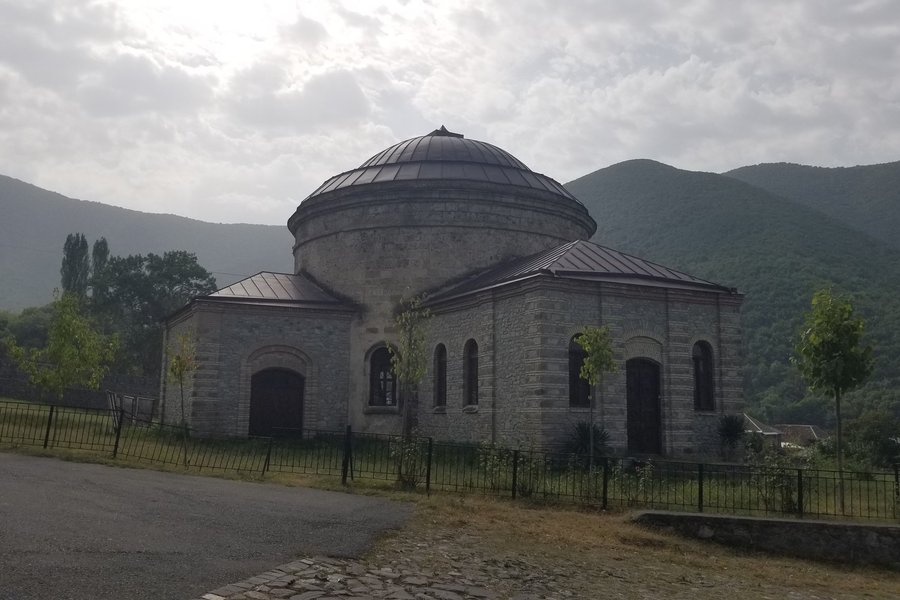
I have been to Sheki twice and I'm not really a fan. There is a nearby airport, Ganja, which has international flights so before I figured I'll fly in from there and then take a bus ride to Baku. That does work. This time I had a car and I also wanted to see the rest of eastern Azerbaijan so Sheki is an obvious location because it's a) out of the "danger" zones, b) has maaaaany hotels and c) isn't exactly bad. The bus trip to Baku was a good 6 hours so do plan accordingly.
On my second trip I mainly wanted to see Sheki's Palace again. It's a wonderful place and surely the highlight of the town. However, they sort of rush you through the place. I literally had to queue longer than going through and the price isn't peanuts. While I do recommend going inside I have to recommendations: look at the entire place from the outside. This is where photos are allowed (not inside). Second would be to actually take a guided tour. It will cost you extra but then you aren't on the rushed tour through. I would have been a bit jealous of the couple that did have the private (English) tour but as I already went through this place before and thus I didn't think twice about it.
For the rest of your time I suggest you just explore the eastern part of the old city by whichever way you like. Cars tend …
Keep reading 0 comments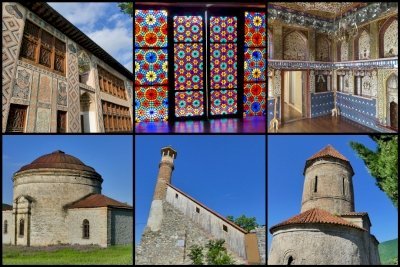
I visited this WHS in 2023 and it really is worthwhile destination when visiting Azerbaijan. Located in the north of Azerbaijan, Sheki is so deeply hidden in the mountain valley of the Greater Caucasus that only red tile roofs and pointed tops of minarets can be seen amidst the dense greenery of the gardens when viewing from above (perhaps the best panoramic viewpoint of the old city is from beneath the World War II Memorial).
The biggest changes in Sheki's old neighborhoods since the early Middle Ages occured mainly during the Soviet Union era (you will surely notice the prevalence of old Lada cars!). The current peaceful setting of Sheki came about through millenia of turbulence in the region. Three millenia ago, Sheki (then called Sakesana or Sake, was one of the most famous cities in Caucasian Albania and at the beginning of the first millenium AD, the doctrine of Christ was brought to Sheki, and the first Christian churches were built here and independent Albanian dioceses arose (the small Church of Kish is definitely worth a visit while in Sheki). Sheki is also a city that stood on the Great Silk Road and once huge bazaars rumbled on the squares, and merchants invited buyers into their tents in dozens of languages and dialects, seducing them with the wonderful aromas of seasonings (the excellent and tasty purple "sumak" springs to mind), a rainbow of luxorious fabrics, the glitter of jewels and the sharpness of foreign swords. A few family-run …
Keep reading 0 comments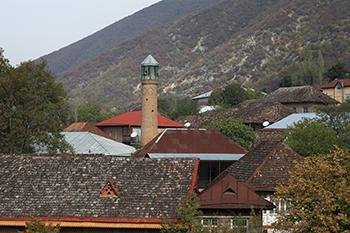
Site visited October 2014. While the majority of tourists in Azerbaijan may not go outside the area of Baku, Sheki is an excellent reason to go there. It is a good place to see the other side of this country as opposite of Baku: traditional architecture and small town feeling in a beautiful setting on foothills of Caucasus Mountains. And the icing on the cake is the exquisite Khan’s Palace. That was also in my mind when I headed to Sheki.
At nine in the evening I hopped on a Sheki bound night train at the Baku railway station. The trip would last 10 hours. I had a bed in a four bed sleeper cabin. In the cabin were also a local father with a child and a granny. They were very friendly and in the beginning of the trip we had a cup of tea and biscuits together. They could speak only few words of English but still we could communicate with each other. At seven in the next morning the train left me alone in the darkness at Sheki railway station which is 15 kilometres away from the city. I waited at the station almost an hour for a taxi to show up.
From the centre of the city I walked along the main thoroughfare of the old city towards the Khan’s Palace. The city was just waking up. It was very quiet and you could see hardly anyone on the streets. Finally I reached the Khan's Palace …
Keep reading 0 comments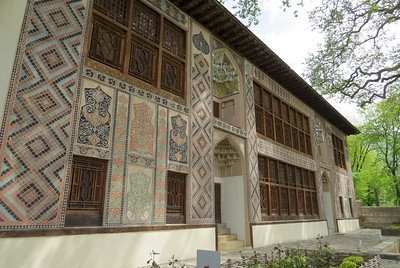
This is a site probably few have heard of – I also did not know about it until I started preparing for my trip to Azerbaijan and stumbled upon this (then) TWHS. Sheki has been an independent country between 1743 and 1813 after it wriggled itself free from Persia. It lies in the far north of Azerbaijan, just below the snow-capped peaks of the Greater Caucasus and the border with Russia. The nomination Sheki, the Khan’s Palace covers more than the palace alone: the town’s trade and industry neighborhoods and vernacular architecture are included as well.
Sheki was the main center of silk production in the Caucasus. It was an important stop on the trade route between “the Dagestan Mountain Traders and the main East-West Caucasus Route”, according to my Trailblazer Guide to Azerbaijan. During my trip, I stayed for 2 nights in one of the two large former caravanserais in the old town: the 18th-century Yuxari Caravanserai. Its grounds are nicely renovated, although the rooms are a bit damp and moldy. But I did enjoy sitting in the little alcove in front of my room in the evenings.
The houses in the old part of Sheki town are all built in a similar style: their walls are a mix of brick and cobblestones, plus wooden windows. It’s a nice and quiet place to walk around, although unfortunately there’s not much you can enter.
The undoubted highlight of Sheki is the 18th-century summer palace of the Khan. …
Keep reading 0 comments
